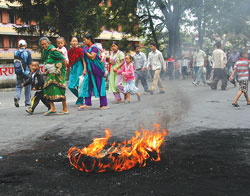|
|
Last week's Maoist meet was supposed to be an opportunity for stock-taking and expressing a renewed commitment to the 12-point agreement, the peace process and elections.
Despite pressure from its rigid factions the leadership held its ground and forged a consensus on staying in government for now and going for elections. All this had to be couched in warlike rhetoric, but at least it was done.
However, the week since has seen a disturbing rise in the activities of YCL warriors and militant students. Extortion is now accompanied by threats just like during the conflict years. Maoist unions have brought foreign investors still left in Nepal on the verge of quitting. Out-of-camp warriors walk around openly in combat fatigues, carrying knives and other weapons.
Most disturbing for us in the media is the use of labour militancy to exert pressure on editorial content (see: 'Stop press', #354 and 'Meet the press', #359). Two national dailies were shut down for five days, and this week Maoists entered the newsrooms to threaten reporters and even tried to kidnap a journalist from a weekly paper. Not even during the king's military rule was the media subjected to such onslaught.
It is important to separate the genuine interests of media employees from politics. Labour issues can now be addressed through negotiations between employee unions and management under the just-passed Working Journalists Act.
It is when employees are used as political tools to put pressure on media and undermine press freedom that things start getting serious. This is in the interest of neither the employees nor the development of the press in Nepal. And ultimately, it undermines democracy.
We are glad to note that this message has now got to senior levels of the Maoist leadership. On Wednesday, Krishna Bahadur Mahara, who also happens to be Minister of Information, unequivocally restated his party's commitment to safeguard press freedom and asked the Federation of Nepalese Journalists to resolve outstanding issues through negotiations.
Then, the leader of the Maoist-affiliated trade union which has been responsible for all the havoc in media and other industries gave a written commitment that his group would no longer disrupt the publication and distribution of newspapers while staging protests. The Patan Appelate Court earlier issued a stay order against the stoppage.
We will have to see whether these commitments translate into behaviour change.The comrades have to address their split personality and decide once and for all whether they are now a political party that believes in pluralism and has abandoned violence as a political tool. Or are they still a rebel group that is determined to establish a totalitarian state by force.
We have given them the benefit of doubt, saying the guerrillas needed time to get used to the politics of compromise. One-and-half years is enough time. Continued use of violence and threats (pic: pedestrians skirting burning tyres during lightning strike by Maoists on Wednesday) in the run-up to November will prove that they don't want elections for which they fought a war that cost this country so dearly.
Realated Articles
. When the going gets tough...
. Mainly in the plains
. Fleeing the flood
. After the deluge
. Classroom No. 9



